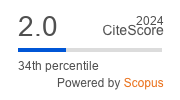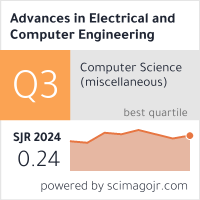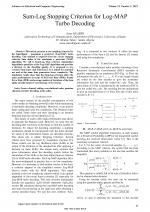| 1/2023 - 5 |
Sum-Log Stopping Criterion for Log-MAP Turbo DecodingOUARDI, A. |
| Extra paper information in |
| Click to see author's profile in |
| Download PDF |
Author keywords
channel coding, convolutional codes, gaussian channels, iterative decoding, turbo codes
References keywords
turbo(31), decoding(23), stopping(21), criterion(12), communications(12), codes(11), letters(9), iterative(7), error(6), electronics(6)
Blue keywords are present in both the references section and the paper title.
About this article
Date of Publication: 2023-02-28
Volume 23, Issue 1, Year 2023, On page(s): 43 - 50
ISSN: 1582-7445, e-ISSN: 1844-7600
Digital Object Identifier: 10.4316/AECE.2023.01005
Web of Science Accession Number: 000937345700005
SCOPUS ID: 85150202224
Abstract
This article presents a new stopping criterion for the logarithmic - maximum a posteriori (Log-MAP) turbo decoding. This method is inspired from the recent stopping criterion Sum alpha of the maximum a posteriori (MAP) algorithm. We call it Sum-Log. This criterion manipulates logarithmic quantities of the Log-MAP algorithm and provides a decision on the decoding quality. It is proposed in two versions Sum-Log-1 and Sum-Log-2. It is aimed for practical use and at the same time guarantees lower complexity. The simulation results show that the Sum-Log criterion offers the same performances in terms of Bit Error Rate (BER), Frame Error Rate (FER) and average number of iterations of the Sum alpha and the famous Cross-Entropy (CE) criteria. |
| References | | | Cited By «-- Click to see who has cited this paper |
| [1] C. Berrou, A. Glavieux, and P. Thitimajshima, "Near Shannon limit error correcting coding and decoding: Turbo-codes," IEEE Proceedings of International Conference on Communications ICC 1993, Geneva, Switzerland, 1993, vol. 2, pp. 1064-1070. [CrossRef] [2] C. Berrou and A. Glavieux, "Near optimum error correcting coding and decoding: turbo-codes," in IEEE Transactions on Communications, vol. 44, no. 10, pp. 1261-1271, 1996. [CrossRef] [Web of Science Times Cited 1808] [SCOPUS Times Cited 2283] [3] A. Ouardi, "Sum-alpha stopping criterion for turbo decoding," International Journal of Electronics and Telecommunications, vol. 67, no. 3, pp. 477-482, 2021. [CrossRef] [Web of Science Times Cited 1] [SCOPUS Times Cited 2] [4] P. Robertson, E. Villebrun, and P. Hoeher, "A comparison of optimal and sub-optimal MAP decoding algorithms operating in the log domain," Proceedings IEEE International Conference on Communications ICC '95, Seattle, WA, USA, 1995. vol. 2, pp. 1009-1013. [CrossRef] [5] L. Bahl, J. Cocke, F. Jelinek and J. Raviv, "Optimal decoding of linear codes for minimizing symbol error rate," in IEEE Transactions on Information Theory, vol. 20, no. 2, pp 284-287, 1974. [CrossRef] [SCOPUS Times Cited 5253] [6] A. Ouardi, A. Djebbari, and B. S. Bouazza, "Optimal M-BCJR turbo decoding: The Z-MAP algorithm," Wireless Engineering and Technology, vol. 2, no. 4, pp. 230-234, 2011. [CrossRef] [7] W. J. Gross and P. G. Gulak, "Simplified MAP algorithm suitable for implementation of turbo decoders," Electronic Letters, IET Journal, vol. 34, no. 16, pp. 1577-1578, 1998. [CrossRef] [Web of Science Times Cited 54] [SCOPUS Times Cited 76] [8] S. Talakoub, L. Sabeti, B. Shahrrava, and M. Ahmadi, "A linear Log-MAP algorithm for turbo decoding and turbo equalization," IEEE International Conference on Wireless And Mobile Computing, Networking And Communications, Montreal, QC, Canada, 2005, vol. 1, pp. 182-186. [CrossRef] [SCOPUS Times Cited 16] [9] H. Wang, H. Yang, and D. Yang, "Improved Log-MAP decoding algorithm for turbo-like codes," in IEEE Communications Letters, vol. 10, no. 3, pp. 186-188, 2006. [CrossRef] [Web of Science Times Cited 31] [SCOPUS Times Cited 40] [10] R. Y. Shao, S. Lin, and M. P. C. Fossorier, "Two simple stopping criteria for turbo decoding," in IEEE Transactions on Communications, vol. 47, no. 8, pp. 1117-1120, 1999. [CrossRef] [Web of Science Times Cited 182] [SCOPUS Times Cited 246] [11] A. Shibutani, H. Suda, and F. Adachi, "Reducing average number of turbo decoding iterations," Electronics Letters, vol. 35, no. 9, pp. 701-702, 1999. [CrossRef] [Web of Science Times Cited 52] [SCOPUS Times Cited 68] [12] M. E. Buckley and S. B. Wicker, "A neural network for predicting decoder error in turbo decoders," in IEEE Communications Letters, vol. 3, no. 5, pp. 145-147, 1999. [CrossRef] [Web of Science Times Cited 14] [SCOPUS Times Cited 19] [13] Y. Wu, B. D. Woerner, and W. J. Ebel, "A simple stopping criterion for turbo decoding," in IEEE Communications Letters, vol. 4, no. 8, pp. 258-260, 2000. [CrossRef] [Web of Science Times Cited 91] [SCOPUS Times Cited 131] [14] F. Zhai and I. J. Fair, "New error detection techniques and stopping criteria for turbo decoding," in 2000 Canadian Conference on Electrical and Computer Engineering, Halifax, NS, Canada, 2000, pp. 58-62. [CrossRef] [15] L. Trifina, H. G. Balta, and A. Rusinaru, "Decreasing of the turbo MAP decoding time using an iterations stopping criterion," IEEE International Symposium on Signals, Circuits and Systems ISSCS 2005, Iasi, Romania, 2005, pp. 371-374. [CrossRef] [SCOPUS Times Cited 10] [16] P. Robertson, "Illuminating the structure of code and decoder of parallel concatenated recursive systematic (turbo) codes," in IEEE 1994 IEEE GLOBECOM. Communications: The Global Bridge, San Francisco, CA, USA, 1994, vol. 3, pp. 1298-1303. [CrossRef] [17] W. J. Ebel, "Turbo decoder stopping based on mean and variance of extrinsics," US6879648 B2, 12-Apr-2005 [18] T. D. Wolf and W. J. Ebel, "Turbo decoder stopping criterion improvement," US6898254 B2, 24-May-2005 [19] L. Trifina, D. TÄrniceriu, and H. BaltÄ, "Threshold determining for MinabsLLR stopping criterion for turbo codes," Frequenz, vol. 67, no. 9-10, pp. 321-326, 2013. [CrossRef] [Web of Science Times Cited 10] [SCOPUS Times Cited 12] [20] F. Gilbert, F. Kienle, and N. Wehn, "Low complexity stopping criteria for UMTS turbo-decoders," The 57th IEEE Semiannual Vehicular Technology Conference, VTC 2003-Spring., Jeju, South Korea, 2003, vol. 4, pp. 2376-2380. [CrossRef] [21] T. M. N. Ngatched and F. Takawira, "Simple stopping criterion for turbo decoding," Electronics Letters, vol. 37, no. 22, pp. 1350-1351. 2001. [CrossRef] [Web of Science Times Cited 31] [SCOPUS Times Cited 52] [22] N. Y. Yu, M. G. Kim, Y. S. Kim, and S. U. Chung, "Efficient stopping criterion for iterative decoding of turbo codes," Electronics Letters, vol. 39, no. 1, pp. 73-75, 2003. [CrossRef] [SCOPUS Times Cited 25] [23] A. Taffin, "Generalised stopping criterion for iterative decoders," Electronics Letters, vol. 39, no. 13, pp. 993-994, 2003. [CrossRef] [Web of Science Times Cited 7] [SCOPUS Times Cited 9] [24] F. Zhai and I. J. Fair, "Techniques for early stopping and error detection in turbo decoding," in IEEE Transactions on Communications, vol. 51, no. 10, pp. 1617-1623, 2003. [CrossRef] [Web of Science Times Cited 48] [SCOPUS Times Cited 66] [25] B. Scanavino, G. M. Maggio, Z. Tasev and L. Kocarev, "A novel stopping criterion for turbo codes based on the average a posteriori entropy," GLOBECOM '03. IEEE Global Telecommunications Conference (IEEE Cat. No.03CH37489), San Francisco, CA, USA, 2003, pp. 2051-2055 vol.4, [CrossRef] [Web of Science Times Cited 6] [26] F. M. Li and A. Y. Wu, "On the new stopping criteria of iterative turbo decoding by using decoding threshold," in IEEE Transactions on Signal Processing, vol. 55, no. 11, pp. 5506-5516, 2007. [CrossRef] [Web of Science Times Cited 34] [SCOPUS Times Cited 40] [27] J. Y. Chen, L. Zhang, and J. Qin, "Average-entropy variation in iterative decoding of turbo codes and its application," Electronics Letters, vol. 44, no. 22, pp. 1314-1315, 2008. [CrossRef] [Web of Science Times Cited 42] [SCOPUS Times Cited 11] [28] S. Asoodeh, "New stopping criterion for turbo code in the presence of SNR mismatch," in 2010 International Congress on Ultra Modern Telecommunications and Control Systems (ICUMT), 2010, pp. 182-186. [CrossRef] [SCOPUS Times Cited 4] [29] A. A. Chaudhry and M. A. Shah, "Comparison and analysis of ECSS based turbo decoder stopping rules," in 2012 International Conference on Emerging Technologies (ICET), Islamabad, Pakistan, 2012, pp. 1-6. [CrossRef] [SCOPUS Times Cited 4] [30] J. Wu , B. R. Vojcic, and J. Sheng, "Stopping criteria for iterative decoding based on mutual information," 2012 Conference Record of the Forty Sixth Asilomar Conference on Signals, Systems and Computers (ASILOMAR), 2012, pp. 183-187. [CrossRef] [SCOPUS Times Cited 5] [31] A. Savin, L. Trifina, and M. Andrei, "Threshold based iteration stopping criterion for turbo codes and for scheme combining a turbo code and a golden space-time block code," Advances in Electrical and Computer Engineering, vol. 14, no. 1, pp. 139-142, 2014. [CrossRef] [Full Text] [Web of Science Times Cited 5] [SCOPUS Times Cited 7] [32] F. Alberge, "On some properties of the mutual information between extrinsics with application to iterative decoding," IEEE Transactions on Communications, vol. 63, no. 5, pp. 1541-1553, 2015. [CrossRef] [Web of Science Times Cited 10] [SCOPUS Times Cited 13] [33] T. P. Fowdur, Y. Beeharry, and K. M. S. Soyjaudah, "A novel scaling and early stopping mechanism for LTE turbo code based on regression analysis," Annals of Telecommunications, vol. 71, no. 7, pp. 369-388, 2016. [CrossRef] [Web of Science Times Cited 8] [SCOPUS Times Cited 14] [34] M. AlMahamdy and J. Dill, "Early termination of turbo decoding by identification of undecodable blocks," IEEE Wireless Communications and Networking Conference (WCNC), San Francisco, CA, 2017, pp. 1-6. [CrossRef] [SCOPUS Times Cited 6] [35] J. Hagenauer, E. Offer, and L. Papke, "Iterative decoding of binary block and convolutional codes," in IEEE Transactions on Information Theory, vol. 42, no. 2, pp. 429-445, 1996. [CrossRef] [Web of Science Times Cited 1551] [SCOPUS Times Cited 1973] [36] M. Y. M. Nasir, R. Mohamad, M. Kassim, N. M. Tahir and E. Abdullah, "Performance analysis of cross-entropy stopping criterion for quadrature amplitude modulation," 2019 IEEE 9th International Conference on System Engineering and Technology (ICSET), Shah Alam, Malaysia, 2019, pp. 273-27. [CrossRef] [Web of Science Times Cited 3] [SCOPUS Times Cited 8] Web of Science® Citations for all references: 3,988 TCR SCOPUS® Citations for all references: 10,393 TCR Web of Science® Average Citations per reference: 108 ACR SCOPUS® Average Citations per reference: 281 ACR TCR = Total Citations for References / ACR = Average Citations per Reference We introduced in 2010 - for the first time in scientific publishing, the term "References Weight", as a quantitative indication of the quality ... Read more Citations for references updated on 2025-11-17 01:57 in 227 seconds. Note1: Web of Science® is a registered trademark of Clarivate Analytics. Note2: SCOPUS® is a registered trademark of Elsevier B.V. Disclaimer: All queries to the respective databases were made by using the DOI record of every reference (where available). Due to technical problems beyond our control, the information is not always accurate. Please use the CrossRef link to visit the respective publisher site. |
Faculty of Electrical Engineering and Computer Science
Stefan cel Mare University of Suceava, Romania
All rights reserved: Advances in Electrical and Computer Engineering is a registered trademark of the Stefan cel Mare University of Suceava. No part of this publication may be reproduced, stored in a retrieval system, photocopied, recorded or archived, without the written permission from the Editor. When authors submit their papers for publication, they agree that the copyright for their article be transferred to the Faculty of Electrical Engineering and Computer Science, Stefan cel Mare University of Suceava, Romania, if and only if the articles are accepted for publication. The copyright covers the exclusive rights to reproduce and distribute the article, including reprints and translations.
Permission for other use: The copyright owner's consent does not extend to copying for general distribution, for promotion, for creating new works, or for resale. Specific written permission must be obtained from the Editor for such copying. Direct linking to files hosted on this website is strictly prohibited.
Disclaimer: Whilst every effort is made by the publishers and editorial board to see that no inaccurate or misleading data, opinions or statements appear in this journal, they wish to make it clear that all information and opinions formulated in the articles, as well as linguistic accuracy, are the sole responsibility of the author.



